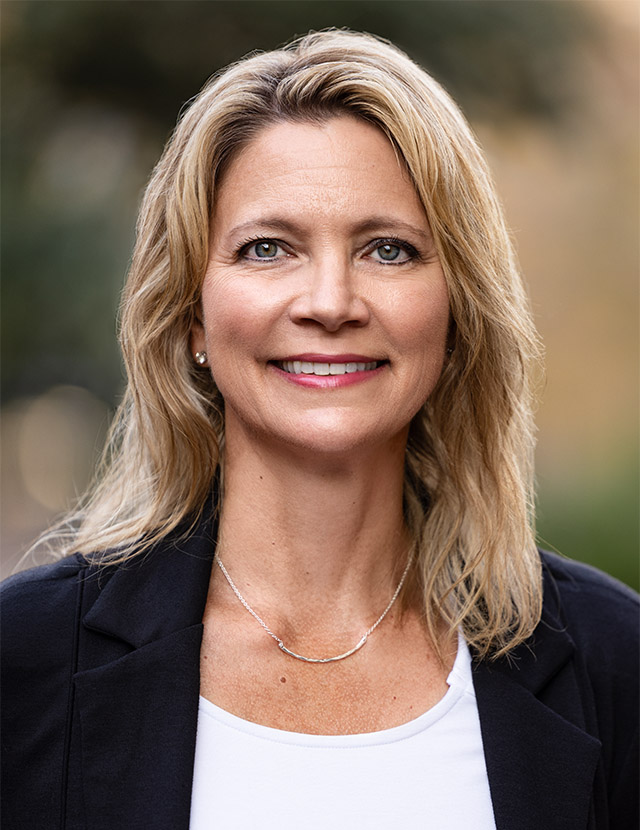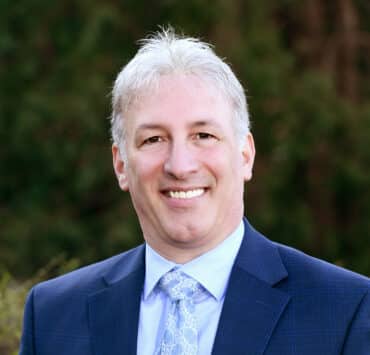Innovation has always driven Jennifer Fox. Originally a research scientist, Fox, executive vice president of external affairs, general counsel, and corporate secretary of Emergent BioSolutions, came to Emergent in 2019 with a new legal vision and strategy to help ensure Emergent remains a leader in protecting the public against health threats.
Like most innovators, Fox’s love of technology inspires her vision, but she recognizes that technology can only go so far before it requires assistance from the human element. “Computers can be good tools and they can complete routine tasks, create automation, and create efficiencies. But more importantly, I’ve always focused on the ability of people and computers working together to create a collective intelligence greater than what people or computers can accomplish on their own,” says Fox.
To realize her vision, Fox modernized her group, replacing routine tasks with automation and encouraging her teams to abandon antiquated processes and to evaluate differently the problems that confront them. Aligned with her philosophy, she led the implementation of artificial intelligence systems to assist them in their tasks.
“Collaboration is bringing the different mindsets and the feedback together to get to the best decision and also bring people along.”
Jennifer Fox
Under Fox’s leadership and in partnership with the IT team, AI now assists her teams in a number of ways, including analyzing invoices and associated narratives to find errors and determining whether vendors adhere to billing guidelines. “Getting people to trust AI is an iterative process, first making sure they view it as a tool not a replacement—a way to enhance their job and make it better rather than replacing them and putting them out of a job. That’s a multi-year maturation process,” says Fox.
Before pivoting to patent law, Fox spent seven years in the lab as a research scientist, beginning at the National Institutes of Health and then at GSK. While there, she earned her JD and stayed on for six more years before moving to Novozymes and then eventually to Brinks Gilson and Lione. She remained at Brinks as a vice president and member of the executive management team and board of directors before moving back in-house to Emergent.
At Brinks, she helped modernized the firm which allowed for greater collaboration, especially across offices, which brought people together and demonstrated that leveraging individuals’ talents across multiple offices better served Brinks’ clients. In 2019, she brought that philosophy and her advocacy for ESG and DEI to Emergent. As the executive sponsor of Emergent’s employee resources groups, Fox helps recognize diversity and inclusion throughout the organization. Emergent’s mission is to protect and enhance life by achieving better healthcare outcomes, and diversity of thoughts and opinions significantly contribute to that success.
Dan Katcher, partner and vice chairman of Joele Frank, Wilkinson Brimmer Katcher, emphasizes how Fox aligns with Emergent’s mission and strengthens the company. “Jennifer’s intellect, industry knowledge, and passion for Emergent’s important work to protect and enhance lives are evident, and it’s a pleasure collaborating with her,” Katcher says, “Our team looks forward to our continued partnership with Jennifer and her team for years to come.”
What makes Fox’s leadership style even stronger beyond her shared passion is how she grounds it in collaboration, not to be confused with consensus. “People think about collaboration and sometimes say, ‘We have to bring everybody to the same conclusion.’ That’s not at all what it is. Collaboration is bringing the different mindsets and the feedback together to get to the best decision and also bring people along,” says Fox.
Rather than assigning tasks to her teams, she provides context and then makes her expectations clear about the desired outcome. “When you help people get to the conclusion of where you need them to go and where you want them to go, and they have control over how to get there, they are ten times more motivated to do what they have put upon themselves instead of what someone else puts upon them,” says Fox.
Emergent, which manufactures some of the most effective FDA-approved biological and chemical pharmaceuticals that address multiple public health threats, enjoys long-standing relationships with the federal government, several state and local governments, and allied foreign governments. In 2018 those relationships deepened when it acquired the original manufacturer of NARCAN® Nasal Spray, a first-line defense in the fight against opioid overdose.
The opioid crisis is non-partisan and non-discriminating. “It can happen to anyone, anywhere, in any socioeconomic status,” says Fox. Emergent’s acquisition of NARCAN® Nasal Spray and more recent FDA approval for over-the counter use “increased the opportunity to help broaden consumer access and help public health systems in the states address the opioid crisis,” Fox points out.
“I’ve always focused on the ability of people and computers working together to create a collective intelligence greater than what people or computers can accomplish on their own.”
Jennifer Fox
A twenty-five-year veteran of the pharma and biotech industries, Fox says biotech companies, especially small ones, are facing new and significant challenges, particularly low-risk tolerance from investors, lower deal flow, and higher interest rates. Fully integrated drug companies that in the past would shepherd a product from cradle to grave are becoming extinct. And, healthcare has evolved, recognizing that one drug does not suit all patients.
“It’s a more recent realization that all humans are not created the same when it comes to safety and efficacy of drugs. For greater health outcomes you need greater specialization and personalization. It’s wonderful that we now have these highly specific and advanced technologies, but it creates a difficult paradigm for how companies will fund their development and how people will afford it,” says Fox.
Smaller companies may possess the latest technology, the brightest opportunity for significant impact, and even achieve FDA approval, but they cannot always bring their products to market because they are strapped for cash. “That is where the low-risk tolerance of investors and high interest rates come in,” says Fox.
“We are at the precipice of treating challenging and rare diseases, but we have not yet figured out the financial and infrastructure components to get it over the finish line,” says Fox. The solution, she says, may lie in consolidation. “That’s going to be one of the biggest opportunities to generate better health outcomes for patients in the next five to ten years.”



